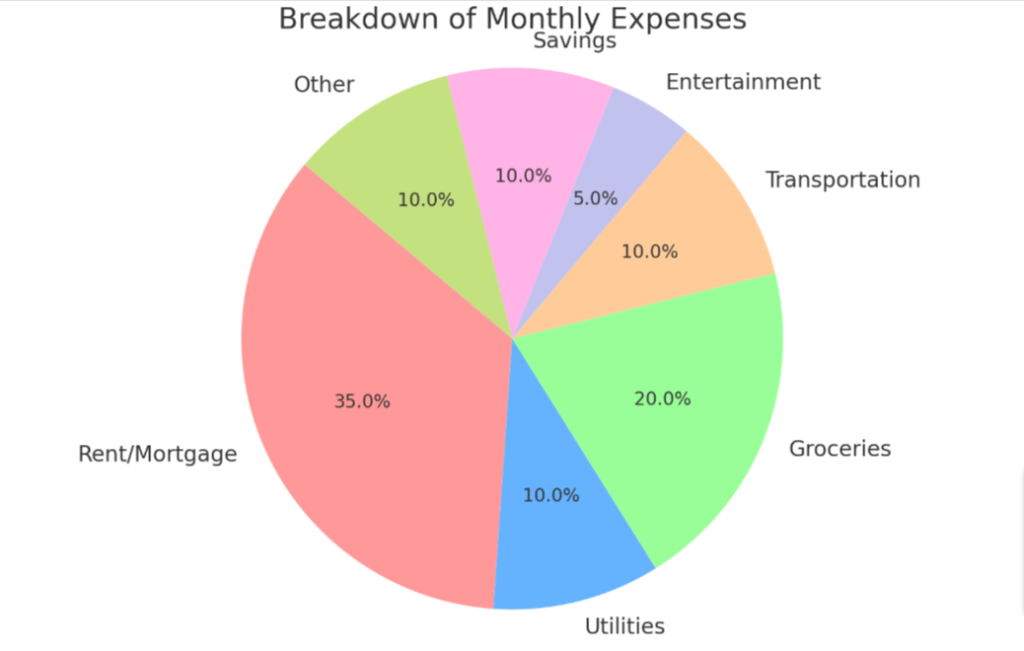Financial Management Mastery: Tracking Earnings and Expenses
Are you feeling overwhelmed by the task of keeping track of all your income and expenses? You’re not alone – a recent survey revealed that over 60% of Americans struggle with tracking their finances.
This blog post will provide simple, practical advice on how to keep an accurate record of your earnings and expenses. Ready to get control over your budget? Let’s dive in!
Key Takeaways
- Regularly track your earnings and expenses to avoid overspending and maintain financial stability.
- Catch fraudulent charges by monitoring all bank and credit card transactions closely.
- Plan for emergency savings by setting aside a portion of each paycheck.
- Understand your spending habits to make informed decisions about budgeting and saving.
The Importance of Tracking Earnings and Expenses
Tracking your earnings and expenses is crucial for several reasons. It helps you avoid overspending, catch fraudulent charges, plan for emergency savings, and gain a better understanding of your spending habits.
Avoid overspending
Overspending can easily derail your financial goals and lead to unmanageable debt. Implementing a structured budget helps to ensure you live within your means, fostering financial stability.
Regularly tracking income and expenses offers insight into spending habits, enabling identification of areas for cost-cutting. This proactive approach promotes fiscal responsibility by preventing unnecessary expenditure, thus helping maintain a positive cash flow.
High-cost items should be carefully considered before purchase; impulse buying often leads to regret later on. Premium versions of products or services aren’t always worth the additional expense either – assess if their value matches their price tag before committing funds.
Catch fraudulent charges
Unnoticed fraudulent charges can cause serious damage to your financial health. Regular monitoring of all bank and credit card transactions is crucial for catching these discrepancies.
With a meticulous eye on your expenses, you will be able to spot any suspicious or unknown charges quickly.
Fraudulent activity does not discriminate between personal finance and business expenses. It’s essential to use secure accounting software that alerts you in real-time about any unusual activities in your business bank account too.
Employing an expense tracker app could add an extra layer of security, allowing instant visibility on every transaction made with your money.
Plan for emergency savings
Building an emergency savings fund serves as a financial safety net. This can protect you from unforeseen expenses such as medical bills or car repairs that are not included in your regular budgeting and expense tracking.

Taking the time to set aside a portion of each paycheck, no matter how small, will gradually build up this essential reserve.
Using personal finance management strategies ensures you have money tucked away for emergencies. Incorporating this into your financial planning involves identifying non-essential expenses and redirecting these funds towards savings.
This approach helps maintain financial stability even when unexpected costs arise, making it a key component of effective income and expense tracking.
Understand spending habits
Understanding your spending habits is essential for effective financial management. By tracking your expenses, you can gain insights into where your money is going and identify any areas of overspending.
This knowledge allows you to make informed decisions about budgeting and saving, helping you achieve your financial goals. Moreover, understanding your spending habits also helps in identifying patterns or trends that may be impacting your finances positively or negatively.
With this understanding, you can adjust accordingly and make better choices when it comes to managing your money.
Tips for Tracking Earnings and Expenses
Track ALL transactions over $1.00, use exact numbers, keep receipts organized, process transactions daily and utilize budget trackers. Don’t miss out on these essential tips!
Track ALL transactions over $1.00
Keeping a close eye on your finances begins with tracking all transactions over $1.00. This simple rule allows you to monitor your spending and identify any unnecessary expenses or potential areas for saving money.
By recording every transaction, no matter how small, you gain a comprehensive view of where your money is going and can make informed decisions about your budget. Utilize tools such as budget trackers or personal finance apps to easily track and categorize each transaction, ensuring that nothing slips through the cracks.
Use exact numbers
Track your earnings and expenses accurately by using exact numbers. Instead of estimating or rounding off amounts, make it a habit to record the exact figures. This will provide you with more precise data for budgeting and financial planning.
By tracking your income and expenses down to the cent, you’ll have a clearer understanding of where your money is going and how much you’re actually earning. It will help you identify areas where you can cut back or save more effectively.
So, whenever you make a purchase or receive income, be sure to note the exact amount in your expense tracker or personal finance app.
Keep receipts organized
To effectively track your earnings and expenses, it’s crucial to keep your receipts organized. This will help you stay on top of your financial transactions and ensure accurate record-keeping. Here are some tips for keeping your receipts in order:
- Sort receipts by category (e.g., groceries, utilities, transportation)
- Use labeled envelopes or folders to store receipts
- Keep a separate folder for business – related expenses
- Consider using a receipt scanner or mobile app for digital documentation
- Make a habit of filing receipts immediately after each transaction
- Maintain a backup system in case of loss or damage

Process transactions daily
To effectively keep track of your earnings and expenses, it is crucial to process transactions daily. This ensures that you have an accurate record of every financial interaction. By staying on top of your transactions, you can quickly identify any discrepancies or fraudulent charges.
Additionally, processing transactions daily allows you to monitor your spending habits in real-time and avoid overspending. Whether it’s through manual tracking or utilizing expense tracking apps, making a habit of processing transactions daily will help you stay organized and in control of your finances.
Utilize budget trackers
Utilize budget trackers to effectively monitor your earnings and expenses. These tools are designed to help you keep track of every transaction and categorize your spending, giving you a clear overview of where your money is going.
By regularly inputting your income and expenses into a budget tracker app or software, you can easily see how much money is coming in versus how much is going out. This allows you to make informed financial decisions, adjust your spending habits if needed, and stay on top of your financial goals.
With the convenience and accuracy that budget trackers provide, managing your finances becomes much simpler and more efficient.
Methods for Tracking Earnings and Expenses
Learn about the most effective methods for tracking your earnings and expenses, including manual tracking and personal finance apps. Discover how these methods can help you stay on top of your finances.
Manual tracking
To manually track your earnings and expenses, keep a record of every transaction you make. This includes both income and expenses. Write down the date, amount, and category for each transaction in a notebook or spreadsheet.
Make it a habit to update your records daily so that nothing gets missed. By manually tracking your finances, you have more control over categorizing your spending accurately and can easily identify any discrepancies or areas where you need to cut back on expenses.
Personal finance apps
Manage your finances more efficiently with personal finance apps. These handy tools make it easier to track your earnings and expenses, giving you a clear picture of your financial situation. Here are some popular personal finance apps that can help you stay on top of your money:
- Mint: This app allows you to link all your financial accounts in one place and automatically categorizes your transactions. You can set budget goals, track bills, and receive alerts for unusual spending.
- PocketGuard: With PocketGuard, you can sync all your accounts and see an overview of your finances in real-time. It categorizes transactions, tracks bills, and even suggests ways to save money.
- Goodbudget: If you prefer the envelope system for budgeting, Goodbudget is perfect for you. It lets you allocate funds into virtual envelopes for different categories, helping you stick to your budget.
- Wally: Wally is great for tracking expenses on-the-go. Simply take a photo of your receipt, enter the amount spent, and categorize it accordingly. It also has features like bill reminders and insights into spending patterns.
- Personal Capital: Personal Capital is ideal if you have investments and want an overall view of your net worth. It provides investment analysis, retirement planning tools, as well as expense tracking.
- YNAB (You Need A Budget): YNAB helps you create a budget based on your income and expenses so that every dollar has a purpose. You can sync it with your bank accounts for accurate tracking and access helpful educational resources.
- Acorns: Acorns focuses on investing spare change from everyday purchases by rounding up transactions to the nearest dollar and investing the difference automatically.
Managing Your Finances
Prioritizing expenses. Making the most of your money. Understanding business expenses. Choosing the right credit cards. Ready to take control? Keep reading!
Prioritizing expenses
To effectively manage your finances, it is crucial to prioritize your expenses. Here are some tips to help you:
- Start by identifying your essential expenses, such as housing, utilities, and groceries.
- Next, allocate a portion of your income towards savings and debt payments.
- Consider the importance and urgency of non – essential expenses before allocating funds.
- Regularly review your discretionary spending and adjust it according to your financial goals.
- Use budgeting tools or apps to track your expenses and ensure that you stay within your allocated budget.
Making the most of your money
To make the most of your money, it’s important to prioritize your expenses and focus on what truly matters. Start by identifying your needs versus wants and allocate your funds accordingly.
This will help you avoid unnecessary spending and maximize the value of every dollar. Additionally, consider using credit cards strategically to take advantage of rewards programs that align with your spending habits.
By being mindful of where your money goes and making informed choices, you can ensure that you are optimizing your financial resources for a secure future.
Another key aspect in making the most of your money is understanding how to leverage business expenses effectively. For small business owners or self-employed individuals, keeping track of all business-related costs is crucial for accurate accounting and maximizing profits.
Set up a separate bank account for business transactions, use accounting software or apps designed specifically for managing business expenses, and monitor cash flow regularly. These practices will help you gain insights into the financial health of your business and make informed decisions to optimize profitability.
Understanding business expenses
Understanding business expenses is crucial for managing your finances effectively. By having a clear understanding of your business expenses, you can make informed decisions about how to allocate your funds and prioritize your spending.
Categorizing your business expenses allows you to track where your money is going and identify areas where you may be overspending or could cut costs. Additionally, understanding your business expenses helps you plan for the future and ensure that you have enough funds set aside for emergencies or unexpected expenses.
By keeping a close eye on your business expenses, you can maintain a healthy cash flow and optimize the financial management of your business.
Choosing the right credit cards
Choosing the right credit cards is essential for effective financial management. Different credit cards offer various benefits and incentives, and by selecting the right ones, you can optimize your spending and saving.
| Credit Card | Benefits | Considerations |
|---|---|---|
| Travel Reward Cards | Offers points or miles that can be redeemed for travel expenses. | Best for frequent travelers. Be aware of annual fees and foreign transaction fees. |
| Cash Back Cards | Gives a percentage of money spent back to the cardholder. | Great for everyday expenditure. However, watch out for rotating categories and spending limits. |
| Balance Transfer Cards | Allows debt from other credit cards to be transferred onto the card, often with a lower interest rate. | Useful for consolidating debt. Always check the transfer fee and the length of the low-interest period. |
| Student Credit Cards | Designed for students with limited credit history. Often offers benefits like cashback on school expenses. | Ideal for building credit history. However, might have higher interest rates. |
| Business Credit Cards | Offers benefits and rewards tailored for business expenses. | Suitable for entrepreneurs and small business owners. Look out for annual fees and consider if the rewards align with your business spending. |
This table provides a basic guide to choosing the right credit card. Remember, each person’s financial situation is unique. Always read the terms and conditions before signing up for a credit card.
Conclusion
Tracking your earnings and expenses is crucial for financial management. By accurately recording your transactions, categorizing spending, and utilizing tools like budget trackers and expense tracking apps, you can gain a clear understanding of your cash flow and make informed decisions about managing your money.
With proper tracking, you can avoid overspending, catch fraudulent charges, plan for emergency savings, understand your spending habits, and ultimately achieve better financial control.
Start implementing these tips today to take charge of your finances.

